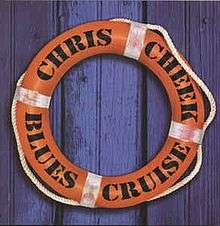Blues Cruise
Blues Cruise is an album by jazz saxophonist Chris Cheek. It was released by Fresh Sound New Talent.
| Blues Cruise | |
|---|---|
 | |
| Studio album by | |
| Released | 2006 |
| Recorded | March 16–17, 2005 |
| Studio | Avatar Studios, NYC. |
| Genre | Jazz |
| Label | Fresh Sound New Talent |
| Producer | Chris Cheek |
Background
Cheek had released three albums for Fresh Sound New Talent before this one.[1] In addition to Cheek on saxophones, the Brad Mehldau trio were the other musicians.[2]
Music and recording
The album was recorded at Avatar Studios, New York City, on March 16 and 17, 2005.[1] Mehldau plays Fender Rhodes on some tracks.[2]
Reception
| Review scores | |
|---|---|
| Source | Rating |
| The Penguin Guide to Jazz | |
The JazzTimes reviewer wrote that "The group strikes an appealing middle ground between old-school and modernist interpretative styles."[2] The Penguin Guide to Jazz described the album as containing "measured thinking, unexpected and slippery development, and a taste for the macabre."[3]
Track listing
- "Flamingo" (Grouya-Anderson) – 5:23
- "Low Key Lightly" (Ellington) – 6:36
- "Coo" (Cheek) – 6:49
- "Squirrelling" (Cheek) – 5:42
- "Song of India" (Korsakov) – 3:47
- "Falling" (Cheek) – 6:19
- "Blues Cruise" (Cheek) – 7:43
- "John Denver" (Cheek) – 6:05
- "The Sweatheart Tree" (Mancini) – 5:08
Personnel
- Chris Cheek – tenor sax, soprano sax
- Brad Mehldau – piano, Fender Rhodes
- Larry Grenadier – bass
- Jorge Rossy – drums
gollark: Thanks!
gollark: I think this is technically possible to implement, so bee⁻¹ you.
gollark: This is underspecified because bee² you, yes.
gollark: All numbers are two's complement because bee you.
gollark: The rest of the instruction consists of variable-width (for fun) target specifiers. The first N target specifiers in an operation are used as destinations and the remaining ones as sources. N varies per opcode. They can be of the form `000DDD` (pop/push from/to stack index DDD), `001EEE` (peek stack index EEE if source, if destination then push onto EEE if it is empty), `010FFFFFFFF` (8-bit immediate value FFFFFFFF; writes are discarded), `011GGGGGGGGGGGGGGGG` (16-bit immediate value GGGGGGGGGGGGGGGG; writes are also discarded), `100[H 31 times]` (31-bit immediate because bee you), `101IIIIIIIIIIIIIIII` (16 bits of memory location relative to the base memory address register of the stack the operation is conditional on), `110JJJJJJJJJJJJJJJJ` (16 bit memory location relative to the top value on that stack instead), `1111LLLMMM` (memory address equal to base memory address of stack LLL plus top of stack MMM), or `1110NNN` (base memory address register of stack MMM).Opcodes (numbered from 0 in order): MOV (1 source, as many destinations as can be parsed validly; the value is copied to all of them), ADD (1 destination, multiple sources), JMP (1 source), NOT (same as MOV), WR (write to output port; multiple sources, first is port number), RE (read from input port; one source for port number, multiple destinations), SUB, AND, OR, XOR, SHR, SHL (bitwise operations), MUL, ROR, ROL, NOP, MUL2 (multiplication with two outputs).
References
- "Chris Cheek – Blues Cruise". Fresh Sound Records. Retrieved December 6, 2016.
- Bryant, Forrest Dylan (January/February 2007) "Chris Cheek – Blues Cruise". JazzTimes.
- Cook, Richard; Morton, Brian (2008). The Penguin Guide to Jazz Recordings (9th ed.). Penguin. p. 244. ISBN 978-0-14-103401-0.CS1 maint: ref=harv (link)
This article is issued from Wikipedia. The text is licensed under Creative Commons - Attribution - Sharealike. Additional terms may apply for the media files.